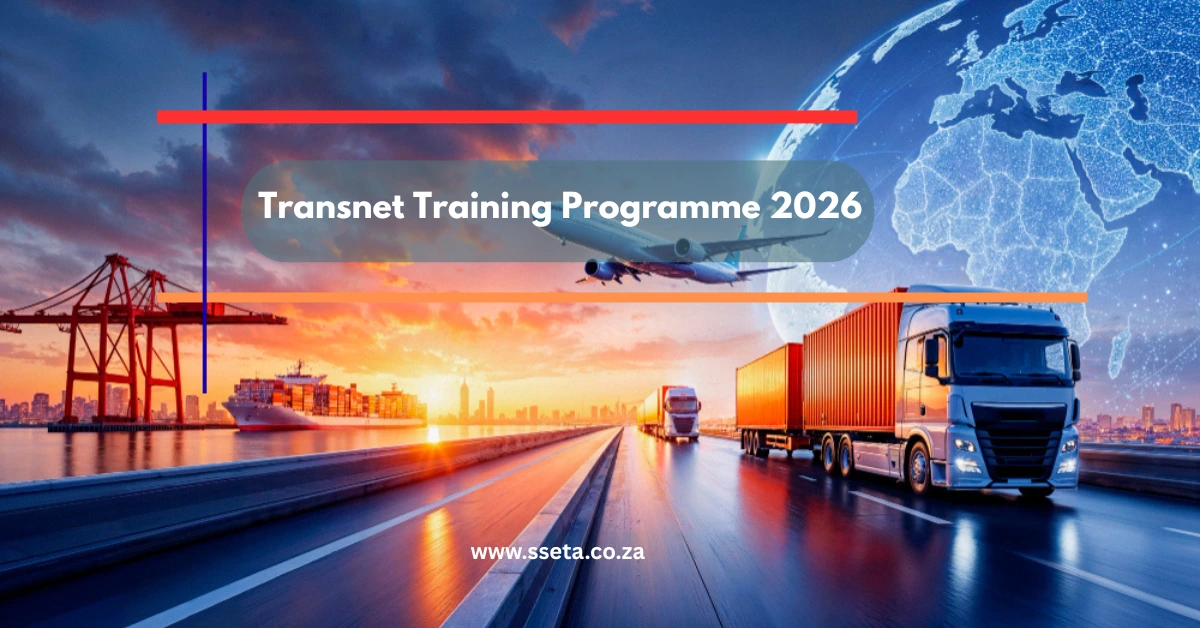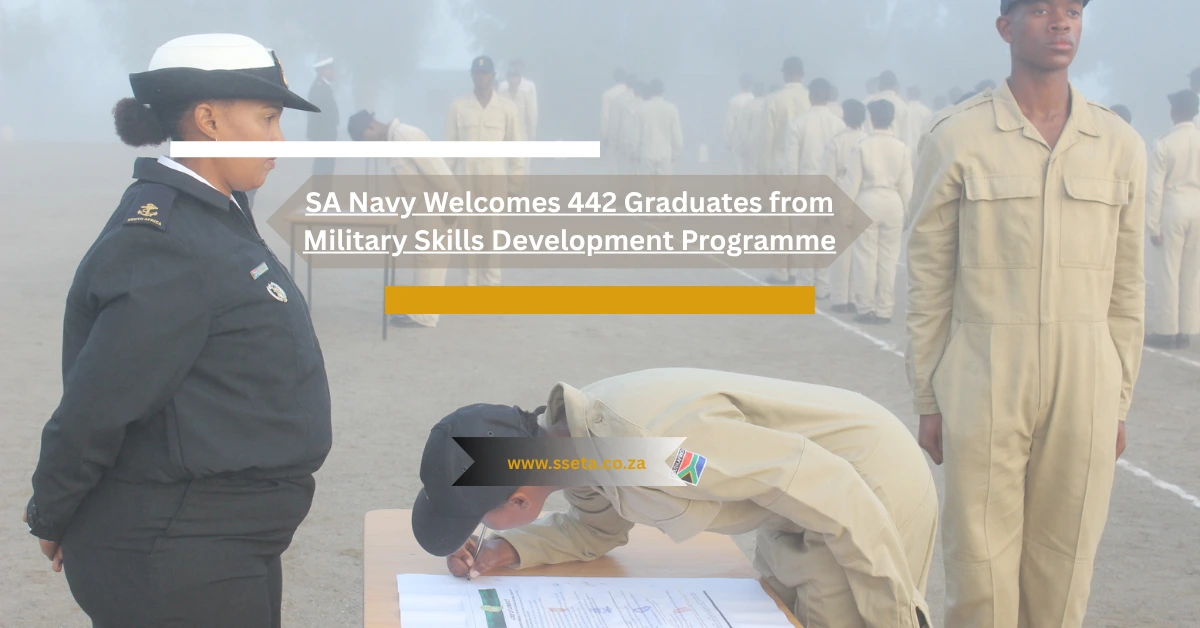The heartbeat of South Africa’s economy lies in its ability to move goods and people efficiently — from bustling ports and sprawling railways to vital freight corridors.
For young South Africans eager to join this movement, the Transnet Training Programme 2026 is more than an opportunity; it’s a career-defining gateway into the logistics and transport sector.
This is a space where steel tracks meet the sea, where cranes rise above container yards, and where every role — from a rail technician to a port operations officer — keeps the economy running. The 2026 intake promises to be one of the most strategic in recent years, aligning with national growth goals and the demand for skilled talent.
1. Understanding the Transnet Training Programme
A Skills Engine for South Africa
The Transnet Training Programme is designed to equip new entrants with practical, industry-relevant skills in rail, port, pipeline, and freight operations.
Its mission is simple yet ambitious: build a skilled workforce that strengthens South Africa’s logistics backbone.
This programme doesn’t just prepare people for jobs — it develops professionals ready to thrive in one of the most demanding and rewarding sectors.
Why Transnet’s Training Matters
Logistics is more than moving goods; it’s ensuring industries have the materials they need, that ports run smoothly, and that trains arrive on time.
By joining Transnet’s training journey, you gain hands-on exposure to critical infrastructure operations while learning from seasoned professionals.
2. Why Choose Transnet in 2026?
- Real Work Experience — You won’t be confined to a classroom.
- Diverse Career Paths — From engineering to supply chain management.
- Industry Recognition — Employers across logistics value Transnet graduates.
- National Impact — Your work helps keep South Africa’s economy moving.
Many who have walked this path now hold influential positions, not only within Transnet but across the global logistics arena.
3. The Legacy of Transnet Training
Transnet has decades of history in investing in human capital.
These programmes have consistently transformed raw potential into industry expertise.
Former trainees often credit the programme with providing the technical skills, professional discipline, and mentorship needed for long-term success.
This is not a short-term internship — it’s a launchpad into a sustainable career.
4. Who Can Apply? Eligibility and Requirements
Academic Criteria
- Minimum: Matric (Grade 12) certificate.
- Certain streams may require Mathematics and Physical Science.
- Technical streams may prefer an N3–N6 qualification from a TVET college.
Personal Attributes
Transnet values:
- A genuine passion for logistics and infrastructure.
- Strong teamwork and communication skills.
- Problem-solving ability and adaptability.
- South African citizenship.
5. Application Process for the 2026 Intake
Where and When to Apply
APPLICATIONS:
APPLY FOR THE TRANSNET YOUNG PROFESSIONALS BUSINESS DEVELOPMENT FOR 2025 HERE
APPLY FOR THE TRANSNET YOUNG PROFESSIONALS LLB FOR 2025 HERE
APPLY FOR THE TRANSNET YOUNG PROFESSIONALS FINANCIAL INFORMATION SYSTEMS FOR 2025 HERE
APPLY FOR THE TRANSNET YOUNG PROFESSIONALS INTERNAL AUDIT FOR 2025 HERE
What You’ll Gain
Participants in the YPT Programme benefit from:
- Practical Work Experience – Hands-on exposure to the daily operations of a large-scale logistics and transport business.
- Mentorship – Guidance from seasoned professionals and industry experts.
- Professional Development – Training workshops, industry seminars, and personal development initiatives.
- Networking Opportunities – Building connections with industry leaders and fellow young professionals.
- Competitive Stipend – A monthly allowance to support participants during their training period.
This combination of learning and practical application ensures graduates are well-equipped to meet industry demands.
What You’ll Need
- Completed online application form.
- Certified copies of your ID, Matric certificate, and other relevant qualifications.
- An updated CV.
- A motivational letter explaining your interest.
6. Tips for a Winning Application
- Be Specific — Mention the business unit or role you’re most interested in.
- Show Research — Reference Transnet projects or operations in your motivation.
- Highlight Soft Skills — Problem-solving, adaptability, and teamwork are key.
- Prepare for Assessments — You may be asked to complete aptitude or psychometric tests.
- Interview Readiness — Use real examples of when you demonstrated responsibility or leadership.
7. Core Training Streams in 2026
Port Operations and Maritime Services
- Cargo handling procedures.
- Vessel planning and container logistics.
- Maritime safety protocols.
Career Paths: Port Operations Officer, Terminal Assistant, Maritime Control Specialist.
Rail Engineering and Operations
- Train mechanics and locomotive systems.
- Track maintenance and signalling systems.
- Rail safety and operational protocols.
Career Paths: Train Driver, Mechanical Fitter, Signal Technician, Track Maintenance Specialist.
Freight Handling and Supply Chain Management
- Warehouse operations and inventory systems.
- Route planning and goods tracking.
- Supply chain efficiency strategies.
Career Paths: Warehouse Supervisor, Logistics Coordinator, Supply Chain Planner.
Specialised Support Roles
- IT systems for logistics.
- Financial management in large-scale transport operations.
- Human resources for operational environments.
8. Benefits of Joining Transnet’s Training Programme
Hands-On Industry Training
Instead of theoretical modules alone, you work alongside professionals in live environments — whether in control rooms, on rail lines, or in container yards.
Mentorship and Career Guidance
Experienced mentors help you adapt, grow, and make informed career decisions.
Mentorship is built into the programme’s culture.
Recognised Qualifications
Depending on your stream, you may graduate with qualifications or certifications respected across the logistics industry.
Career Progression Opportunities
Transnet often hires directly from its training graduates.
Opportunities exist for specialisation and leadership development.
9. Preparing Before You Apply
Research Transnet’s Divisions
Understanding units like:
- Transnet Freight Rail
- Transnet National Ports Authority
- Transnet Pipelines
…will allow you to tailor your application.
Build Your Soft Skills
Even before applying, work on:
- Communication.
- Team collaboration.
- Problem-solving under pressure.
Stay Organised
Create a checklist of application documents.
Set reminders for application deadlines.
10. The Selection Journey
Stage 1: Online Application
Your first impression is your CV and motivation letter.
Stage 2: Testing
Aptitude, technical, or personality assessments to measure suitability.
Stage 3: Interviews
Panel or one-on-one interviews to gauge cultural fit and technical knowledge.
Stage 4: Final Selection
Successful candidates receive formal training contracts.
11. Life After the Programme
Many graduates secure permanent roles within Transnet:
- Operational roles — on the ground keeping systems running.
- Technical roles — maintaining, repairing, and innovating.
- Managerial paths — overseeing teams and operations.
The logistics industry is vast — and skills gained here are transferable globally.
12. Why 2026 Is a Strategic Year to Join
Global supply chains are evolving rapidly.
South Africa’s infrastructure investments, coupled with a renewed focus on rail freight revitalisation and port modernisation, mean trained professionals will be in high demand.
The 2026 Transnet Training Programme aligns perfectly with this growth trajectory.
Conclusion: A Future You Can Build Today
The Transnet Training Programme 2026 isn’t just about learning — it’s about building a career in one of the country’s most essential industries.
From the first day you step into the training environment, you become part of a network that moves South Africa forward.
If you’re ready to contribute to the nation’s economic heartbeat, develop skills that matter, and open doors to a lifetime of opportunities, now is the time to prepare.
Your journey into South Africa’s logistics future can start here — with one application, one opportunity, and a commitment to growth.



